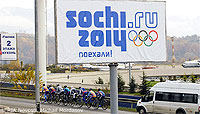Putin’s Caucasian Games

(Bloomberg editorial – Bloomberg.com – January 3, 2014) Russian President Vladimir Putin clearly intends next month’s Winter Olympics in Sochi as a showcase for the country’s re-emergence as a global power. Given his recent diplomatic coups in Syria and Ukraine, maybe he thinks that he has plenty to show off.
Yet this week’s twin suicide bombings in Volgograd, which killed at least 32 people, ensure the games will also highlight something else: Russia’s continued failure to integrate the North Caucasus, Russia’s predominantly Muslim underbelly.
The 30,000 troops and police who will soon deploy to Sochi may well be able to ensure the games go off safely (indeed, the attackers’ choice of Volgograd may mean that Sochi is already seen as impregnable). But Putin was wrong to say on New Year’s Day that the atrocities required “no additional comment.” They should hasten a wide review of his policies in the region.
At least 700 people were killed in 2012 as a result of insurgent conflicts in the North Caucasus, home to about 9 million people. Last year was only slightly better. Since Doku Umarov, leader of the Caucasus Emirate group, ended a self-imposed halt to attacks on the rest of Russia in July, there have been three bombings in Volgograd.
No amount of terrorist violence is acceptable, of course, and terrorists such as Umarov — who wants to turn the North Caucasus into a single Islamist emirate — are no less difficult to eradicate in Russia than elsewhere. And the nationalist and ethnic grievances that trouble the region long predate Putin.
Still, Putin’s authoritarian tendencies have had an especially corrosive effect on the people of the North Caucasus. His policies have entrenched a culture of violence, corruption and dependency, driving the young professionals who might develop self-sustaining economies to emigrate.
One reason for this is Putin’s “vertical power” system of governance. It has undermined democracy and rule of law everywhere in Russia, but it has achieved its most extreme and distorted form in the North Caucasus: All taxes go to Moscow and are returned as subsidies that account for as much as 85 percent of the local economies. Power has been concentrated in the hands of Kremlin-picked strongmen who funnel this money, returning the favor by helping to fix national elections for Putin’s United Russia party. Corruption has so rotted the police and judiciary that locals turn to warlords and informal Shariah courts for justice. Unaccountable security forces are helping to drive disillusioned young men into the arms of radicals.
Putin’s system has given autonomy to barons such as Ramzan Kadyrov in Chechnya and Dagestan President Ramazan Abdulatipov, but not to ordinary citizens. The arduous process of building democratic institutions needs to finally begin, starting with the introduction of direct elections for regional governors. Ironically, more integration of the North Caucasus with the rest of Russia may be required, rather than less. It could start with the recruitment of more young men into the Russian armed forces, which has all but ceased, and the imposition of civil protections that exist elsewhere in the country.
Unfortunately, things appear headed in the opposite direction. Russia’s rubber-stamp parliament last year effectively excluded the North Caucasus republics from the resumption of direct gubernatorial elections in the rest of Russia. Abdulatipov, a Kremlin loyalist chosen to replace his predecessor last year, has reversed a planned amnesty for insurgents and closed even moderate religious institutions in a pre-Sochi crackdown.
Nothing will change, of course, before the last downhill racer has left Sochi. After the Olympics are gone, however, the problems of the North Caucasus will remain. Only a new approach can resolve them.
Article ©2014 Bloomberg L.P. All Rights Reserved. Article also appeared at http://www.bloomberg.com/news/2014-01-03/putin-s-caucasian-games.html
